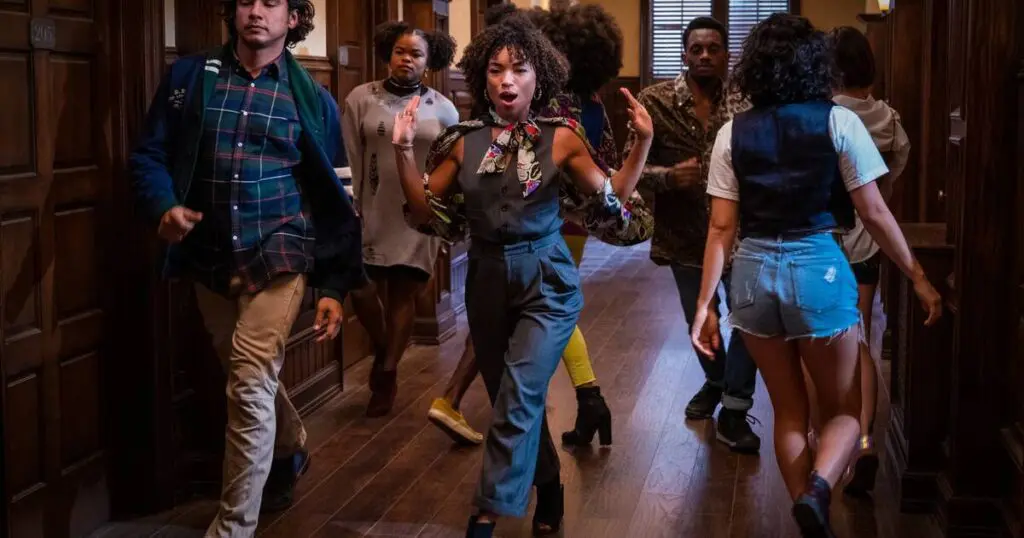Summary
A glimpse into the future while reminiscing on senior year.
This review of Netflix’s Dear White People season 4 contains minor spoilers.
In the final volume of Dear White People, we are transported to the future. A future with another pandemic, masks and more video calls. Sounds very familiar — it was annoying at first because pandemic content isn’t my favourite genre. But, I really enjoy content where the main characters are set in the future and reminisce on their experiences from the past. We learn that Lionel is the author of the bestselling book Dear White People and Sam is a filmmaker whose documentary was bought by CNN during her time at Winchester. At a cafe, both Sam and Lionel are brainstorming ideas for the next project and remember their experiences in Winchester.
Inspired by the Varsity Show that happened during senior year, Sam suggests that they come together to write a novel and create a limited TV series of the musical, saying ‘it could be like how Arthur C. Clarke and Stanley Kubrick made 2001: A Space Odyssey, the movie and book, side by side.’ From then, we flashback to senior year with Troy trying to get everybody on board for the Varsity Show and emphasises the benefit it will have for future Black students at Winchester — “Just think of the uptick in Black student applications, the performance, the film, literary and political pipelines that’ll be created for future generations”. But, we also learn that Troy’s emphasis for the musical to be set in the 90s is rooted in the unconscious desire to return to the time when he had his mother present in his life.
Everyone’s career aspirations slowly come into fruition on career day, except for Sam’s. From being mistaken for a girl that directed a film about teen pregnancy and being ignored by film executives at Winchester, she’s found at a dead end and breaks into song with Gabe by her side. We learn that Lionel looked up to Sam, Reggie, Coco and Troy whilst at university and it’s nice to see the change in confidence he has post-college.
Iesha is a new character, constantly keeping Sam and the other Black students on their toes with her direct and uncompromising ways. When Troy proposed the musical to the Black Caucus, she was first to admit that it’s horrible and that it’s cake walking for the institution — she even dragged Beyoncé under the bus, emphasizing that she “cakewalks better than most”, even though she took Disney’s money for Black is King. Meanwhile, my favourite character, Coco Conners, was fabulous as always with her ambition to be the first woman to win on Big House — a reality show for students from Ivy League institutions. Unlucky for her, they pit her against another Black girl and you know how that goes — constantly pitting Black women against each other like they can’t be friends who support one another.
I also loved how in episode 4 when Coco, Sam, and Lionel meet via Zoom, Coco mentions the disparities in representation – “using the light-skinned privilege to tell our stories”, a word! The way Dear White People touches on the realities of Black people at elite institutions is what I love the most. I constantly criticize Sam for being biracial and trying to speak to “the Black experience” but it’s been crafted so well because that’s what it’s like in the real world with light-skinned Black people and biracial people taking the centre stage whilst the dark-skinned Black people are left in the shadows. This is probably why Sam felt threatened by Iesha because they are exactly the same except Iesha isn’t biracial and is uncompromising in her beliefs.
Flashforward to episode 8 with Joelle’s dilemma concerning God and medicine — it was nice to see because it’s the reality for a lot of religious Black people in the health field and Coco was the first Black woman to win the reality show! She pulled the typical ‘woe is me’ card as a poor Black woman from the Southside and her abortion — but she still won! Coco is a favourite of mine because she knows the realities of being a dark-skinned Black woman at an elite institution, so she deserved that win. She’s committed to her political aspirations and definitely grew from her internalised misogynoir from previous volumes.
All in all, the final series was just right — the angst, the emotions, the acting, and of course, the musical was the best way to end Dear White People and it definitely deserves 5 stars.
What did you think of Dear White People season 4? Comment below.




